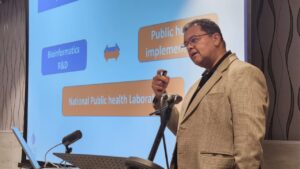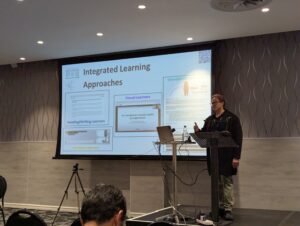
Editorial
A warm welcome to 2024!
Outbreaks on respiratory diseases, influenza and diarrheal diseases have been reported in the first two months of 2024, globally. These health threats caused by viruses and bacteria highlight the continual need of joined efforts in curbing the spread of disease among people, animals and plants. At the Public Health Alliance of Genomic Epidemiology (PHA4GE), we continue to play our part in addressing some of these challenges through advancing work in microbial genomics.
In this bumper newsletter edition, we feature conference news and recent updates from our Working Groups in strengthening the interoperability, accessibility and reproducibility of pathogen genomics data globally. Against the backdrop of the picturesque Cavalli Estate in Somerset West, the inaugural PHA4GE Conference (#PHA4GECon) embarked on its exhilarating journey from October 30th to November 1st, 2023. The conference was a flurry of activity featuring captivating presentations, thought-provoking discussions, networking, and invaluable insights from emerging researchers and esteemed experts in the field of pathogen genomics, bioinformatics and public health.
Prior to the conference, workshops took place on October 27th and 28th, 2023. The workshops provided a dynamic platform for students, emerging researchers, public health personnel and field experts to delve into hands- on training on some of the cutting-edge topics in pathogen genomics, bioinformatics and public health.
An insightful piece is provided by the Infrastructure Working Group, that describes the usefulness of cloud buckets for bioinformaticians in storing immutable bulk data and their easier integration with other cloud-based tools to analyze the stored data. A description is given on storing data on two different platforms – CLIMB and Terra.
The Bioinformatics Pipelines and Visualization Working Group offers freely accessible software development standards; whilst the Data Structures Working Group present a draft wastewater contextual data specification. The draft specification will require testing and a current call for sub-awardees for testing this specification can be found here. Further community input is requested in projects relating to building a data standards registry and defining a sample in public health genomics.
The Ethics and Data Sharing Working Group showcase the completed work of four sub-award projects from Botswana, Ethiopia, Nepal and South Africa. The focus of the projects was: promoting interoperability in Botswana eHealth systems, exploring ethical challenges faced in conducting public health research in conflict-affected regions in Ethiopia, creation of a framework that promotes development of comprehensive guidelines for the ethical and equitable use of health research data generated in Nepal, and from South Africa, tackling the necessity of provision of comprehensive training in research ethics among emerging researchers.
Do enjoy the read!
Zenande Mgijima
If you haven’t done so already, subscribe to receive PHA4GE newsletter via email.



